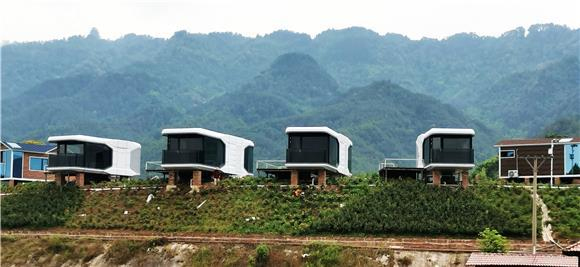What is Eco-Friendly Modular Construction?
Eco-friendly modular construction refers to the use of prefabricated building modules that are produced off-site in a controlled factory setting and then assembled on-site. The construction process is faster, cleaner, and more efficient compared to traditional on-site building methods. However, the key difference with eco-friendly modular construction lies in its use of green building materials and energy-efficient designs that reduce the environmental impact of both construction and operation.
Eco-friendly modular buildings typically incorporate:
- Energy-efficient insulation and windows
- Solar energy systems and renewable energy integration
- Sustainable building materials, such as recycled or locally sourced resources
- Water-saving technologies like rainwater harvesting systems
By combining the speed and flexibility of modular construction with green building techniques, eco-friendly modular construction is creating buildings that not only minimize environmental impact but also offer long-term cost savings for building owners.
Sustainability at the Core: The Environmental Benefits of Modular Construction
One of the most compelling advantages of modular construction is its ability to minimize environmental impact. Unlike traditional construction methods, which often produce significant waste and require large amounts of energy, modular construction is highly efficient, with the potential to reduce waste, energy consumption, and carbon emissions.
Key sustainability benefits of eco-friendly modular construction include:
Reduced Construction Waste: Since modular components are produced in a factory setting, there is less waste generated on-site. Factory-controlled conditions ensure precise measurements, reducing material waste and inefficiency.
Energy Efficiency: Modular buildings can be designed with energy-efficient systems that reduce the need for external energy sources. Solar panels, high-efficiency HVAC systems, and superior insulation make these buildings more energy-efficient, reducing their carbon footprint.
Sustainable Materials: The use of sustainable materials in modular construction not only reduces the environmental impact but also promotes the use of renewable resources. From eco-friendly insulation to low-emission paints, these materials contribute to a healthier, more sustainable building environment.
Faster Construction Timelines: Modular construction reduces the time spent on-site, which in turn reduces the overall environmental disruption caused by construction. Shorter timelines mean less energy used in the construction process, contributing to overall sustainability.
Why Eco-Friendly Modular Construction is the Future
As the world continues to face challenges related to climate change, resource depletion, and urbanization, eco-friendly modular construction offers a sustainable solution that can address these issues. The construction industry is one of the largest contributors to global carbon emissions, but modular construction provides a path forward by reducing waste, enhancing energy efficiency, and incorporating eco-friendly materials.
Key reasons why eco-friendly modular construction is the future of building include:
- Scalability: Modular construction can be used for projects of all sizes, from single-family homes to large commercial developments.
- Cost-Effectiveness: Though the initial cost of eco-friendly materials may be higher, the long-term energy savings and reduced maintenance costs make eco-friendly modular buildings highly cost-effective.
- Customization: Modular construction allows for greater flexibility in design, making it easier to integrate green building features like renewable energy systems and energy-efficient materials.
- Long-Term Sustainability: Modular buildings designed with sustainability in mind are built to last, offering long-term durability and reduced environmental impact throughout their lifecycle.
The Future of Construction: A Sustainable Path Forward
As more consumers, businesses, and governments prioritize sustainability, eco-friendly modular construction is poised to become the industry standard. Modular buildings that prioritize green technologies, energy efficiency, and environmentally responsible practices will continue to shape the future of construction. This method not only reduces the carbon footprint of the construction industry but also provides cost-effective, energy-efficient solutions for modern building needs.
With its combination of speed, sustainability, and eco-conscious design, eco-friendly modular construction is set to play a key role in achieving the global goal of a sustainable future.
Call to Action (CTA):
Want to learn more about how eco-friendly modular construction can benefit your next project? Contact us today to explore sustainable building solutions that are both innovative and eco-conscious!



